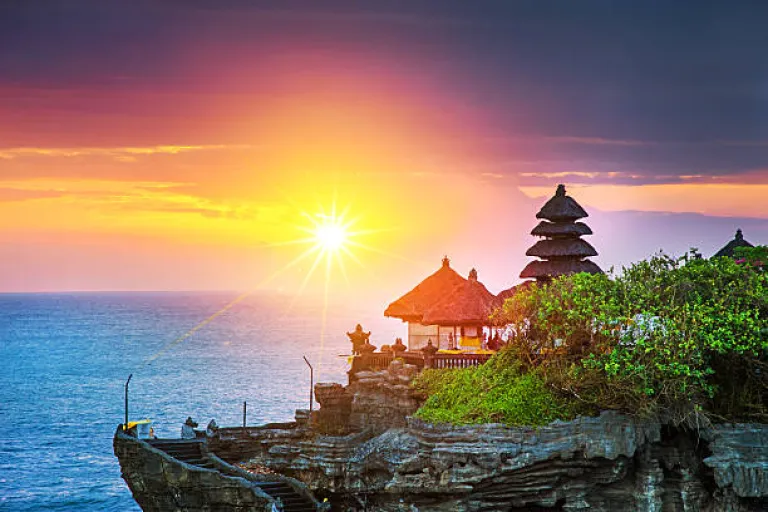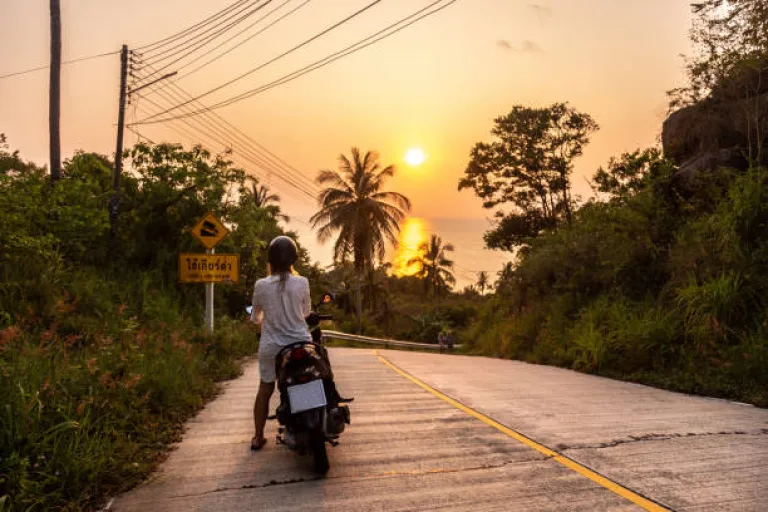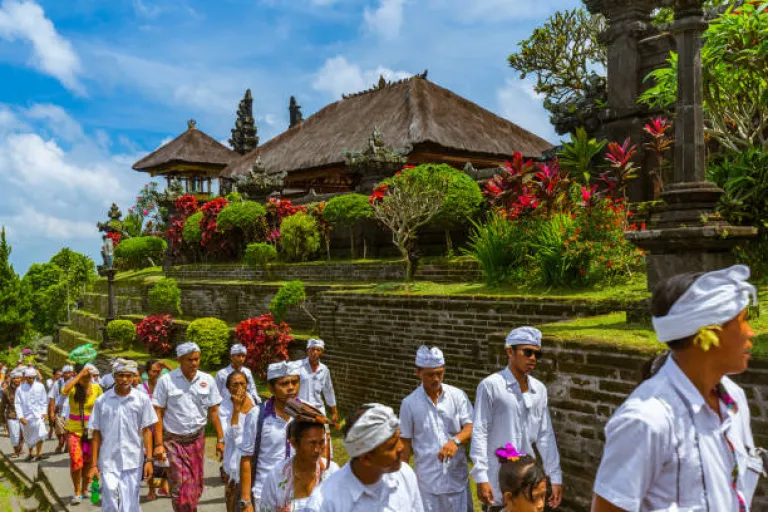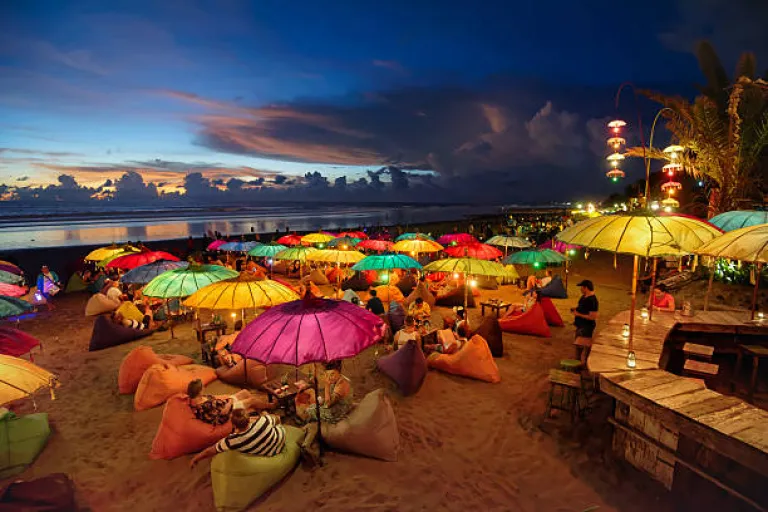10 Things You Need to Know Before Traveling to Bali

Bali, Indonesia's crown jewel, isn't just about picture-perfect beaches and lush rice terraces, it's a vibrant playground full of surprises, where a little prep goes a long way!
Imagine zipping around on scooters, bargaining like a pro at colorful markets, and savoring mouthwatering nasi goreng, all while dodging Bali Belly and navigating quirky local customs.
From visa-free perks to Go-Jek rides and knowing where to find legit money exchangers, these handy tips will make your Bali trip smoother than a sunset cocktail on Seminyak Beach.
Get ready for an unforgettable adventure where culture, fun, and a bit of savvy planning collide!
1. Visa & Entry Requirements

For Indian passport holders, Bali offers visa-free travel for stays up to 30 days. Upon arrival at Denpasar’s Ngurah Rai International Airport, you simply proceed to immigration, where your passport will be stamped.
Ensure your passport is valid for at least six months from the date of entry, and that you have a return ticket or onward travel booking ready to show, as immigration officials may request it.
If you plan to stay longer than 30 days, consider obtaining a Visa on Arrival (VoA) for around ₹2,500 (IDR 500,000). This visa is extendable for another 30 days at local immigration offices.
Pro Tip: Immigration queues at Denpasar can be overwhelming, especially during peak seasons (July-August, December-January). Fast-track services are available for an extra fee to skip the long wait.
2. Transportation: Getting Around Safely

Bali's lack of a developed public transportation system means tourists rely heavily on scooters, private cars, and taxis.
Scooters: Renting a scooter costs around ₹400-800 (IDR 75,000-150,000) per day. Always wear a helmet, carry an international driving permit (required by law), and exercise caution, especially in crowded areas like Kuta and Ubud.
Private Cars with Drivers: This is a fantastic option for families or groups. Daily rentals start at ₹2,500-4,000 (IDR 500,000-800,000) for a car with a driver who doubles as a guide. It’s a comfortable and efficient way to explore multiple destinations.
Ride-Hailing Apps: Download Go-Jek or Grab for affordable rides. These apps are particularly useful for short distances or when you're unsure about local taxi fares.
Important Note: Bluebird taxis are the most reliable metered taxis. Avoid unmetered taxis or negotiate a fare beforehand to avoid overcharging.
3. Currency & Managing Finances

The currency used is the Indonesian Rupiah (IDR). Carry small denominations, as many local vendors may not have change for large bills. ATMs are widely available, but choose those attached to banks for added security.
Exchange money only at authorized outlets like PT Central Kuta Money Exchange, known for its fair rates and transparency.
Beware of roadside stalls offering higher rates; they often shortchange tourists through subtle tricks. Count your money carefully and insist on a receipt.
Cashless Payments: Apps like Dana and Go-Pay are gaining traction, especially in urban areas like Seminyak. While they’re convenient, they require local phone numbers for setup.
Also read: How Much Does a Bali Trip Cost for Couples? Budget Guide for Indian Travelers
4. Staying Connected: Internet & SIM Cards

Bali boasts excellent connectivity, making it a hotspot for digital nomads. While free Wi-Fi is ubiquitous in cafes, hotels, and restaurants, a local SIM card ensures reliable access.
Recommended Providers: Telkomsel and XL Axiata offer the best coverage, even in remote areas like Nusa Penida or the Bukit Peninsula.
Cost: A prepaid SIM with 10GB of data costs around ₹600-1,000 (IDR 100,000-200,000).
Buy your SIM card at the airport for convenience, though prices may be slightly higher than in local stores.
5. Cultural Etiquette: Respect the Local Traditions

Bali’s culture is deeply rooted in Hinduism, and respecting its customs is crucial for a positive experience.
Temple Etiquette: Always dress modestly when visiting temples. Wear a sarong and sash (usually provided at the entrance) to cover your legs and waist.
Ceremonies: Balinese ceremonies are frequent and vibrant. Streets may be closed for processions, so be patient and respectful.
Avoid stepping on offerings (called canang sari), which are small flower-and-food tributes placed on sidewalks daily.
Pro Tip: Learn a few simple phrases in Bahasa Indonesia, like “Terima kasih” (thank you) and “Permisi” (excuse me). Locals appreciate the effort.
6. Food & Health: Indulge but Stay Safe

Bali’s culinary scene is a treat for the senses. Don’t miss these must-try dishes:
Nasi Goreng: Fried rice served with a fried egg on top.
Babi Guling: Balinese-style roast pork.
Sate Lilit: Minced fish skewers infused with spices.
While indulging, beware of Bali Belly, a common traveler’s illness caused by contaminated food or water.
Stick to bottled or filtered water.
Avoid ice in drinks unless you're certain it’s made from purified water.
Choose busy eateries with high turnover for fresher food.
Carry basic medications, including rehydration salts and probiotics, to handle any stomach troubles.
Also read: 7 Best Wellness Treatments You Can Only Get In Bali
7. Sustainable Travel Tips

Bali is grappling with overtourism and environmental challenges. Play your part by:
Avoiding single-use plastics; carry a reusable water bottle and straw.
Supporting eco-friendly businesses like Bali Eco Deli or The Green School.
Respecting nature: Don’t litter or disturb marine life when snorkeling or diving.
8. Shopping & Bargaining

Markets in Bali are vibrant and packed with souvenirs like handmade crafts, textiles, and unique home decor. Some popular spots include:
Ubud Art Market: Ideal for wood carvings and batik fabrics.
Seminyak Village: A modern alternative for boutique shopping.
Bargaining Tips: Start by offering 50% of the quoted price and negotiate politely. Smile; it’s part of the culture!
Also read: 11 Souvenirs to buy in Bali on your next trip
9. Top Activities & Hidden Gems

While spots like Tanah Lot, Uluwatu Temple, and Ubud Monkey Forest dominate travel itineraries, don’t miss these lesser-known treasures:
Sekumpul Waterfall: A serene escape into Bali’s natural beauty.
Amed: Perfect for diving and laid-back coastal vibes.
Nyang Nyang Beach: A secluded haven for peace seekers.
10. Peak Season & Crowds

Bali is bustling year-round, but the dry season (May to September) is the best time to visit. While popular spots like Kuta and Seminyak can get crowded, quieter areas like Sidemen Valley and Lovina Beach offer tranquil alternatives.
Conclusion

Bali is the perfect mix of adventure, culture, and pure bliss. With a little know-how, you’ll not only soak in the island’s iconic spots but also uncover some hidden gems along the way.
Roll with the surprises, enjoy every tasty bite and scenic view, and remember; leave Bali even more beautiful than you found it (because who wouldn’t want to come back?).
Happy travels and may your Bali memories be as unforgettable as the sunsets!
Published at
About Author
Prerna Dixit
Subscribe our Newsletter
Get our weekly tips and travel news!
Related Posts
10 amazing hacks for comfortable train journeys in India
Make your Indian train journey comfortable with these 10 hacks: choose the right class, pack essentials, stay hydrated, wear comfy clothing, charge devices, bring entertainment, prioritize safety, book lower berths, use travel apps, and socialize.
10 Amazing New Attractions in Singapore - Indian Travelers Guide 2025
Explore the new yet amazing attractions of Singapore
10 Hidden Destinations In Northeast India
Immerse yourself in the magic of unexplored landscapes, vibrant cultures, and breathtaking adventures. Ready to redefine your wanderlust?
10 Important Things you should know about South Korea before traveling
Explore the wonders of South Korea with 10 Important Things to Know Before Traveling. This blog unveils cultural insights, from decoding Hangul to navigating bustling streets.
10 Luxury Hotels in Bangalore That Are Too Good To Be True
From regal palaces to eco-chic retreats, join us as we uncover the city's 10 Luxury Hotels that redefine opulence!
Latest Posts
You don't Need FASTag anymore? Everything you need to know!
No more FASTag from May 1st?
10 Dreamy Experiences for Couples in Kashmir
Fancy some romantic experiences in Kashmir?
How much will a trip to Indonesia cost from India? Travel Budget Guide
Need to budget a tropical getaway from India to Indonesia?
Indian Traveler's 7 Day Itinerary for Island Hopping in Indonesia
Your perfect Indonesian island getaway guide is here!
Best 4-Day Itinerary for Kashmir, India
Ready to fall in love with Kashmir in just four days?

